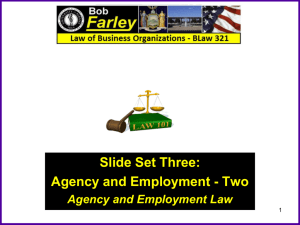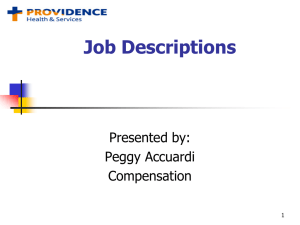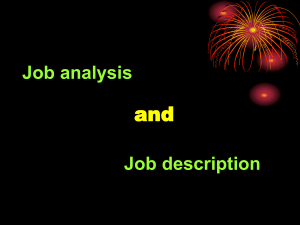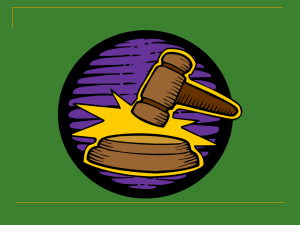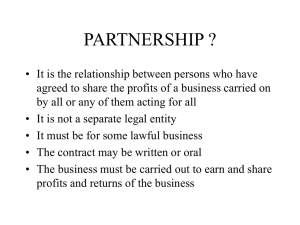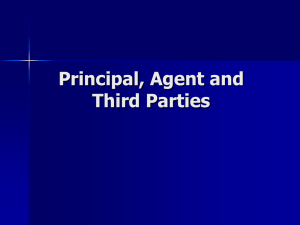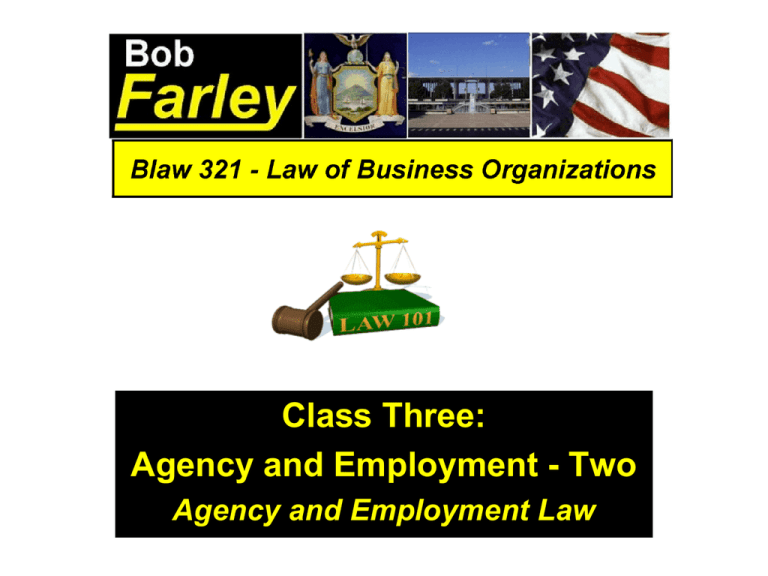
Class Three:
Agency and Employment - Two
Agency and Employment Law
Last week we spoke about:
• Introduction to Agency
• What is a Agency?
- A legal relationship (based in contract) where one party (the agent) is authorized to
represent another party (the principal) in business dealings with third parties
• Creation of the Agency Relationship
- Capacity, Formalities (Consent / Consideration / Writing) , and Modes (By Act of the
Parties / By Operation of Law)
• Authority
- Actual (How the Agent and Principal see the Authority): Express and Implied
- Apparent (How third parties see the Authority)
- Inherent (Situational Context of Authority): Agent turned loose
• Ratification
- When an Agency Relationship is created after the Act
Tonight we will speak about:
• The Agency Relationship: Liabilities and Duties
- Liabilities of Parties in Agency
Principal: Liable if Agent has Authority
Agent: Liable if doesn’t have authority or doesn’t disclose authority
- Duties of Parties in Agency
Duty: The Legal Concept of Duty
Remedies: What happens if breach of duty occurs
• Employment Law
- What is Employment
Employment vs. Independent Contractor
- Employment at Will
Employment at Will vs. Employment Contracts
- Employment Regulation
Equal Opportunity: Federal Civil Rights Law, State Human Rights Law
Collective Bargaining: Federal NLRA, State Labor Law, Taylor Law
THE FUNDAMENTALS OF AGENCY
Liabilities of the Parties
A. Generally
Having established that there is a valid contract entered into by an agent for her
principal, the next step is to determine who the parties to the contract are, and what
their rights and liabilities are under the contract.
1. Third Party vs. Principal
The general rule is that if the agent had authority, the principal is liable to the third party.
2. Third Party vs. Agent
Whether an agent can be held liable on a contract the agent enters into on behalf of the principal
depends on whether the principal was disclosed, partially disclosed, or undisclosed.
a. Disclosed Principal Situation
A disclosed principal is one whose existence and identity are known to the third party.
1) Disclosed Principal Liable
A disclosed principal is always liable on a contract entered into by an authorized agent.
2) Agent Generally Not Liable
A third party generally has no action against an agent in a disclosed principal situation because the contract
is with the principal. There are, however, certain well-recognized exceptions to this rule:
a) Intent of Parties
Where the intent of the parties is that the agent shall be a party to the contract, she will be held liable.
Note: One should examine the intent to determine if both the agent and the principal are to be held liable, or
the principal alone.
b) Agent's Implied Warranty of Authority
When an agent enters into a contract purportedly on behalf of a disclosed principal, the agent makes an
implied warranty of authority (i.e., a warranty that she has the authority that she purports to have). Thus,
although the agent generally is not liable in contract when she contracts for a disclosed principal, she may
nevertheless be held liable to the third party for breach of her implied warranty if she acted without
authority. For breach of warranty, she is liable to the third party for actual (not contract) damages.
THE FUNDAMENTALS OF AGENCY
Liabilities of the Parties
A. Generally Continued
Having established that there is a valid contract entered into by an agent for her
principal, the next step is to determine who the parties to the contract are, and what
their rights and liabilities are under the contract.
2. Third Party vs. Agent
Whether an agent can be held liable on a contract the agent enters into on behalf of the principal
depends on whether the principal was disclosed, partially disclosed, or undisclosed.
b. Partially Disclosed and Undisclosed Principal Situations
A partially disclosed principal is one whose existence, but not identity, is known to the third party.
Note: If the third party should have reasonably known that the person with whom he was dealing was acting for
a principal, he would be deemed to have known of the principal's existence. An undisclosed principal is
one whose existence and identity are unknown to the third party.
1) Both Agent and Principal Liable
Both the agent and the principal are liable on a contract entered into by an authorized agent on behalf of a
partially disclosed or undisclosed principal.
2) No Election to Hold Principal or Agent
The third party, upon learning the identity of the principal (and in the undisclosed principal situations also
learning of his existence), may hold the principal and agent liable. A judgment against either one is not a
bar to suit against the other except to the extent the judgment has been satisfied. [See U.C.C. §3-401]
3) Undisclosed Principal Not Liable on Negotiable Instruments
Under the U.C.C., an undisclosed principal is not liable on a negotiable instrument executed by his
authorized agent.
THE FUNDAMENTALS OF AGENCY
Liabilities of the Parties
A. Generally Continued
Having established that there is a valid contract entered into by an agent for her
principal, the next step is to determine who the parties to the contract are, and what
their rights and liabilities are under the contract.
3. Right to Hold Third Party Liable on Contract
a. Disclosed Principal Situation-Principal May Enforce Contract
In a disclosed principal situation, only the principal, not the agent, may enforce the contract and hold the third
party liable.
b. Partially Disclosed and Undisclosed Principal Situation - Principal or Agent May Enforce Contract
In partially disclosed and undisclosed principal situations, either the principal or agent may enforce the contract
and hold the third party liable. However, if the agent enforces the contract, the principal is entitled to all of the
rights and benefits thereunder.
1 Situations Where Principal May Not Enforce Contract
Some situations exist, however, where the principal will not have a right to specifically enforce the contract
against the third party.
a) Fraudulent Concealment of Principal's Identity
Where the agent has fraudulently concealed the identity of the principal, the contract will not specifically
be enforceable by the principal and, indeed, the third party has a right to rescission. The majority of courts
hold that there must have been an affirmative misrepresentation by the agent for this exception to operate.
b) Increase of Burden to Third Party
Where performance by the principal would impose an undue burden on the third party (by virtue of the fact
that it is the principal and not the agent to whom performance must be made), the contract may not be
specifically enforced and the third party will have a right to rescission.
Note: Agent Adam, on behalf of an undisclosed principal, Preston, enters into a "requirements" contract
with Sam. In fact, the requirements of Principal Preston are substantially greater than Sam believed
the requirements of Adam to be. Sam may avoid this contract.
THE FUNDAMENTALS OF AGENCY
Liabilities of the Parties
A. Generally Continued
4. Specifically – Liability of Agent to Third Person
• An agent who makes a contract with a third person within the scope of authority has
no personal liability on the contract (as the liability is with the principal);
• A person purporting to act as an agent for a principal warrants by implication that
there is an existing principal with legal capacity and that the principal has authorized
the agent to act.
• If the person acting as an agent is not authorized, such agent is then liable for any
loss caused to the third person for breach of these warranties.
5. Specifically – Liability of Principal to Third Person
• An agent takes on the assumption of liability for contracts signed by an agent, when
the principal appoints the agent.
• Upon the execution of the contract, if the agent wishes to avoid personal liability,
they should sign the principal’s name and then put “by” or “per” agent’s name.
• Agent’s Statements: A principal is bound by an agents statements when the agent
makes such statements while acting within the scope of actual or apparent authority.
• Agent’s Knowledge: A principal is imputed (deemed bound) by an agent’s
knowledge gained while acting within the scope of actual or apparent authority.
THE FUNDAMENTALS OF AGENCY
Liabilities of the Parties
THE FUNDAMENTALS OF AGENCY
Liabilities of the Parties
THE FUNDAMENTALS OF AGENCY
Liabilities of the Parties
THE FUNDAMENTALS OF AGENCY
Liabilities of the Parties
THE FUNDAMENTALS OF AGENCY
Liabilities of the Parties
THE FUNDAMENTALS OF AGENCY
Duties and Liabilities Between Agents and Principals
1. General Rules
While the agency relationship exists, the agent owes the principal the duties of:
(1) being loyal,
(2) obeying all lawful instructions,
(3) exercising reasonable care,
(4) accounting for all property or money belonging to the principal, and
(5) informing the principal of all facts relating to the agency that are relevant
to the principal’s interests.
While the agency exists, the principal owes the agent the duties of:
(1) To compensate the agent as agreed;
(2) To indemnify and protect the agent against claims, liabilities, and expenses
expenses incurred in discharging the duties assigned by the principal;
(3) To act in accordance with the express and implied terms of any contract
between the principal and an agent;
(4) Due to the fiduciary relationship, a principal owes his/her agent a duty of good faith
and fair dealing, however, a principal can be relieved of contractual obligations by
an agent’s prior breach of contract; and
(5) When an agent acts within the scope of actual authority, the principal is liable to
indemnify the agent for payments made during the course of the relationship
irrespective of whether the expenditure was expressly authorized or merely
necessary in promoting the principal’s business
THE FUNDAMENTALS OF AGENCY
Duties and Liabilities Between Agents and Principals
2. What is Duty
a. Duty Defined:
Black’s Law Dictionary defines “DUTY” as:
1. A person’s action which is exactly conformable to the laws which
require the person to obey them; or
2. A legal or moral obligation; or
3. Conduct or service which is obligatory; or
4. A mandatory obligation to perform.
b. Simple definition of “Duty”:
“A legally recognized obligation
requiring certain conduct
by one person to another.”
THE FUNDAMENTALS OF AGENCY
Duties and Liabilities Between Agents and Principals
3. Duties of Agent to Principal
The agent has whatever duties are expressly stated in their contract with their principal.
Additionally, in the absence of anything contrary in the agreement, the agent has three
major duties implied by law: loyalty, obedience, and care.
a. Duty of Loyalty
The fiduciary duty of an agent to his principal is one of undivided loyalty. If an agent has
interests adverse to the interests of his principal (e.g., self-dealing or obtaining secret profits),
then such agent will be seen as in breach this duty by failing to disclose.
b. Duty of Obedience
1 General Rule
An agent must obey all reasonable directions of his principal. While the principal may well be
liable for the agent's acts in violation of directions (apparent or inherent authority), the agent
will be liable to the principal for any loss that the principal suffers.
2. What Constitutes Reasonable Directions
Reasonableness depends on custom, the nature of the work, and contractual understanding.
Example: A janitor would be expected to follow minute instructions regarding his daily work effort
while an attorney would not normally be expected to follow his client's directions as to how
to draft a complaint.
THE FUNDAMENTALS OF AGENCY
Duties and Liabilities Between Agents and Principals
3. Duties of Agent to Principal Continued
The agent has whatever duties are expressly stated in their contract with their principal.
Additionally, in the absence of anything contrary in the agreement, the agent has three
major duties implied by law: loyalty, obedience, and care.
c. Duty of Reasonable Care
1. Compensated Agent
An agent owes a duty to his principal to carry out his agency with reasonable care, in light of
local community standards and taking into account any special skills of the agent.
2. Gratuitous Agent
The modem trend is to hold a gratuitous or uncompensated agent to the degree of care
customary in the community for one undertaking similar tasks without compensation. In most
situations, this results in no difference between the standard for paid and unpaid agents.
3. Duty to Notify
An agent has a duty to notify his principal of all matters that come to the agent's knowledge
affecting the subject of the agency. The effect of this rule is that notice of all such matters
coming to the attention of the agent is imputed to the principal.
Example: Notice will not be imputed under certain circumstances, e.g., where the agent acts in their
own interest and adversely to the principal, or where the agent and the third party attempt
to commit a fraud on the principal.
THE FUNDAMENTALS OF AGENCY
Duties and Liabilities Between Agents and Principals
4. Remedies of the Principal
The principal has a variety of remedies against the agent for breach of duty.
a. Action for Damages
An agent may be liable either for breach of contract or in tort.
1. Breach of Contract-Compensated Agents
A compensated agent may be held liable for damages suffered by the principal as a result of
breach of contract. All of the remedies and methods of calculating damages that apply in
normal breach of contract situations apply to a breach of contract for a compensated agent
as well.
2. Tort-All Agents
An agent, whether compensated or gratuitous, may be held liable for damages resulting from
their misuse of the principal's property, whether intentional or negligent, or because of
misperfomance, or failure to perform.
b. Action for Secret Profits
Where an agent breaches her fiduciary duty and secretly profits, the principal may recover the
actual profits or property held by the agent.
Example: Alan the Agent is employed full-time by Paula the Principal to purchase timberland for Paula in a
designated area. Alan purchases some land in the designated area for himself with his own money.
The law will find that Alan holds the land as constructive trustee for Paula and must convey it to
Paula at cost.
Example: Alan the Agent is employed as a clerk in Paula the Principal's retail store. All goods are marked with
a fixed price. Alan sells a $20 radio to a customer for $25. Alan must give Paula the additional $5
even though Paula has suffered no injury.
THE FUNDAMENTALS OF AGENCY
Duties and Liabilities Between Agents and Principals
5. Duties of Subagent to Principal and Agent
Where a subagent has been appointed with proper authority, he too will owe the
principal the same duties as would the agent.
a. Liability of Agent for Subagent Breaches
An agent will be held liable to the principal for breaches of a subagent. This is so even though the
agent exercised diligence and good faith in appointing the subagent.
b. Liability of Subagent to Agent
1. General Rule
The subagent owes the agent the same duties they owe the principal; thus, they will be liable to
the agent for their breaches.
2. Unauthorized Subagent
Where the subagent has been appointed without authority, the subagent does not owe any
duties to the principal. The agent alone will be responsible to the principal for performance of
the agency duties and for any loss sustained because of the subagent's conduct, with the
agent's only recourse being against the subagent.
THE FUNDAMENTALS OF AGENCY
Duties and Liabilities Between Agents and Principals
6. Duties of Principal to Agent
a. Duties Imposed by Operation of Law
1. Compensation
The principal owes the agent a duty to compensate her reasonably for their services unless,
of course, the agent has agreed to act gratuitously. It should be noted that a principal has
no duty to compensate a subagent, even if the agent was authorized to hire subagents,
unless the principal agrees otherwise.
2. Reimbursement
The principal owes the agent (and any authorized subagent) a duty to indemnify them for all
expenses or losses reasonably incurred in discharging any authorized duties, including any
legal liability incurred by the agent in acting for her principal, unless the loss was due solely
to the agent's fault.
b. Duties Imposed by Contract
The principal also has a duty to comply with the terms of any contract between him and the
agent. Such a contract can, however, vary the terms of the common law duties.
c. Duty to Cooperate
As a general rule, the principal should cooperate with his agent to help her carry out agency
functions. Thus, the principal must provide the agent with the requisite opportunities and not
unreasonably interfere with the agent's performance. Accordingly, the scope of the duty is
measured by what is reasonably contemplated by the parties.
Example: If Patty Principal hires Arthur Agent for $500 a month to sell widgets, Patty has no obligation to
provide Arthur with widgets to sell. If Arthur is to be paid by commission however (or Arthur's
compensation is otherwise based on the results of her work), it is reasonable for Arthur to assume
that Patty will provide him with an opportunity to work, and so must provide Arthur with widgets.
Example: If Patty Principal hires Arthur Agent to sell his empty factory building on commission, Patty cannot
then lease the building to a third party.
THE FUNDAMENTALS OF AGENCY
Duties and Liabilities Between Agents and Principals
7. Remedies of Agent
a. Breach of Contract
A compensated agent has the usual remedies for breach of contract. An agent does
however have a duty to mitigate (lessen) their damages
Example: Anna the Agent executes an employment contract with Phillip the Principal. Under the 10-year
written contract Anna will be provided with a salary of $40,000 per year. Phillip fires Anna after two
years without cause. Anna cannot spend the next eight years in Acapulco on vacation and collect her
money. She must actively seek other employment (in an attempt to mitigate her damages).
b. Agent's Lien
An agent has a possessory lien (i.e., a claim against the principal's property held by
the agent) for any money due to the agent, unless the contract provides otherwise.
Example: Alma the Agent purchases coins for Pherb the Principal with her own funds. Pherb does not
reimburse Alma for the cost of the coins. If Alma still has possession of the coins, she has a lien
upon them until Pherb pays her for the same.
THE FUNDAMENTALS OF AGENCY
Duties and Liabilities Between Agents and Principals
8. Real Estate Brokers’ Contracts
a. Exclusive Contract
An exclusive contract entitles a real estate broker to a commission if the realtor or anyone else
(e.g., the owner or another broker) produces a buyer who is ready, willing, and able to buy the
real estate.
It should be noted, however, that sometimes the owner will specifically reserve the
right to find his own buyer without having to pay the broker a commission (this is known as a
nonexclusive contract, see below).
b. Nonexclusive Contract (Subject to Prior Sale)
A nonexclusive contract (or listing agreement) normally entitles a real estate broker to
compensation when she has produced a buyer who is ready, willing, and able to buy, provided
the property has not already been sold (i.e., the owner has the right to find his own buyer before
the broker does).
Under a nonexclusive contract, the broker is entitled to their commission when they produce a
ready, willing, and able buyer even though the sale is not consummated. Occasionally,
however, a nonexclusive contract will specifically provide that the commission is due only when
the sale is consummated. In such a case, the broker is not entitled to compensation until the
conveyance (not the contract of sale) has been made.
c. Right to Compensation
A real estate broker or salesperson must be licensed to enforce a claim for commissions. This
applies to full- or part-time brokers and salespersons. [See NYS Real Property Law §442-d]
THE EMPLOYMENT RELATIONSHIP
EMPLOYMENT:
1. What is Employment
a. Employment Defined:
Black’s Law Dictionary defines “Employment” as:
1. Act of employing or state of being employed; or
2. That which engages or occupies; or
3. That which consumes time or attention; or
4. An occupation, profession, trade, post or business.
b. Simple definition of “Employment” is:
“An act to engage or hire one’s service,
in return for payment for such service.”
c. Labor Law Definition:
A relationship where someone is “permitted or suffered to work”
THE EMPLOYMENT RELATIONSHIP
EMPLOYMENT:
2. Employment v. Independent Contractor
1. The Employer- Employee Relationship
a. Definitional Standards
1. Independent Contractor
A clear example of an independent contractor is one who has a calling of his own, is
hired to do a particular job, is paid a given amount for that job, and who follows his own
discretion in carrying out the job. A principal has no right to control the manner and
method in which an independent contractor performs the job.
2. Employee
A clear example of an employee is one who works full-time for his employer, is
compensated on a time basis, and is subject to the supervision of the principal in
the details of his work. An employer has the right to control the manner and
method in which an employee performs the job.
b. Determination of Right to Control
There are many cases where it is not clear whether the relationship is one of employeremployee or principal-independent contractor. The single overriding factor in
determining whether a person is an employee is whether the principal (employer) has
the right to control the manner and method by which the individual performs his tasks.
THE EMPLOYMENT RELATIONSHIP
EMPLOYMENT:
3. Employment at Will v. Employment Contract
1. Employment at Will Concept
New York State is an Employment at Will state.
This means that an employer can pay the employee what they wish (so long as it is above
minimum wage), provide what benefits (if any) that they wish, and dismiss (fire) an employee for
any reason or no reason as long as it is not an illegal reason (such as a violation of the Federal
Civil Rights law or New York State Human Rights law).
2. Employment Contract
An exception to the employment of will doctrine is where the employee and employer have an
employment contract. In such instance the contract terms will govern the parameters of the
employment. A collectively bargained employee is determined to have an employment contract
as negotiated and approved by the employer and the employee’s representative (union).
3. When it is unclear if there is an Employment Contract
Under certain circumstances whether an employment contact exists can be unclear. Under
such circumstances, courts have imposed other documents (such as an employee manual) to
constitute an employment contract.
THE EMPLOYMENT RELATIONSHIP
EMPLOYMENT:
4. Employment Regulation
1. Equal Opportunity
A. Federal Civil Rights Law:
Federal Civil Rights Law Prohibit Employment Discrimination on the basis of race, color,
religion, sex, or national origin, age, gender, disability and pregnancy. Such discrimination
can be contested by means of a civil action under 42 U.S.C. Section 1983.
B. State Human Rights Law
Section 290 of the NYS Executive Law provides that the “opportunity to obtain employment
without discrimination because of age, race, creed, color, national origin, sexual orientation,
military status, sex, marital status, or disability, is hereby recognized as and declared to be a
civil right.” Such rights can be enforced through both civil and governmental actions.
2. Collective Bargaining
A. National Labor Relations Act
The National Labor Relations Act (Wagner Act – 29 U.S.C Section 151 et seq.) that
provides that private sector employees have a right to collectively bargain.
B. State Labor Relations Act
New York has a nearly identical law (Article 20 of the State Labor Law)
C. Taylor Law
This New York Law – Article 14 of the State Civil Service Law grants public sector
employees the right to collectively bargain.
3. Heath and Safety Laws
Both the Federal and State Government have health and safety laws (Such as OSHA and the
Labor Law) which regulate workplace conditions, minimum wages, and hours of employment.
THE EMPLOYMENT RELATIONSHIP
EMPLOYMENT:
5. Additional Issues in Employment
THE EMPLOYMENT RELATIONSHIP
EMPLOYMENT:
5. Additional Issues in Employment
THE EMPLOYMENT RELATIONSHIP
EMPLOYMENT:
5. Additional Issues in Employment
THE EMPLOYMENT RELATIONSHIP
EMPLOYMENT:
5. Additional Issues in Employment
THE EMPLOYMENT RELATIONSHIP
EMPLOYMENT:
5. Additional Issues in Employment
THE EMPLOYMENT RELATIONSHIP
EMPLOYMENT:
5. Additional Issues in Employment
THE EMPLOYMENT RELATIONSHIP
EMPLOYMENT:
5. Additional Issues in Employment
THE EMPLOYMENT RELATIONSHIP
EMPLOYMENT:
5. Additional Issues in Employment
THE EMPLOYMENT RELATIONSHIP
EMPLOYMENT:
5. Additional Issues in Employment
THE EMPLOYMENT RELATIONSHIP
EMPLOYMENT:
5. Additional Issues in Employment
THE EMPLOYMENT RELATIONSHIP
EMPLOYMENT:
5. Additional Issues in Employment
THE EMPLOYMENT RELATIONSHIP
EMPLOYMENT:
5. Additional Issues in Employment
THE EMPLOYMENT RELATIONSHIP
EMPLOYMENT:
5. Additional Issues in Employment
THE EMPLOYMENT RELATIONSHIP
EMPLOYMENT:
5. Additional Issues in Employment
THE EMPLOYMENT RELATIONSHIP
EMPLOYMENT:
5. Additional Issues in Employment
THE EMPLOYMENT RELATIONSHIP
EMPLOYMENT:
5. Additional Issues in Employment
THE EMPLOYMENT RELATIONSHIP
EMPLOYMENT:
5. Additional Issues in Employment
THE EMPLOYMENT RELATIONSHIP
EMPLOYMENT:
5. Additional Issues in Employment
THE EMPLOYMENT RELATIONSHIP
EMPLOYMENT:
5. Additional Issues in Employment
THE EMPLOYMENT RELATIONSHIP
EMPLOYMENT:
5. Additional Issues in Employment
THE EMPLOYMENT RELATIONSHIP
EMPLOYMENT:
5. Additional Issues in Employment
Thank you for Coming
• Bonus Questions of the Day
• For next time – Read Chapter 41
We are a hot bench.
• Questions.

